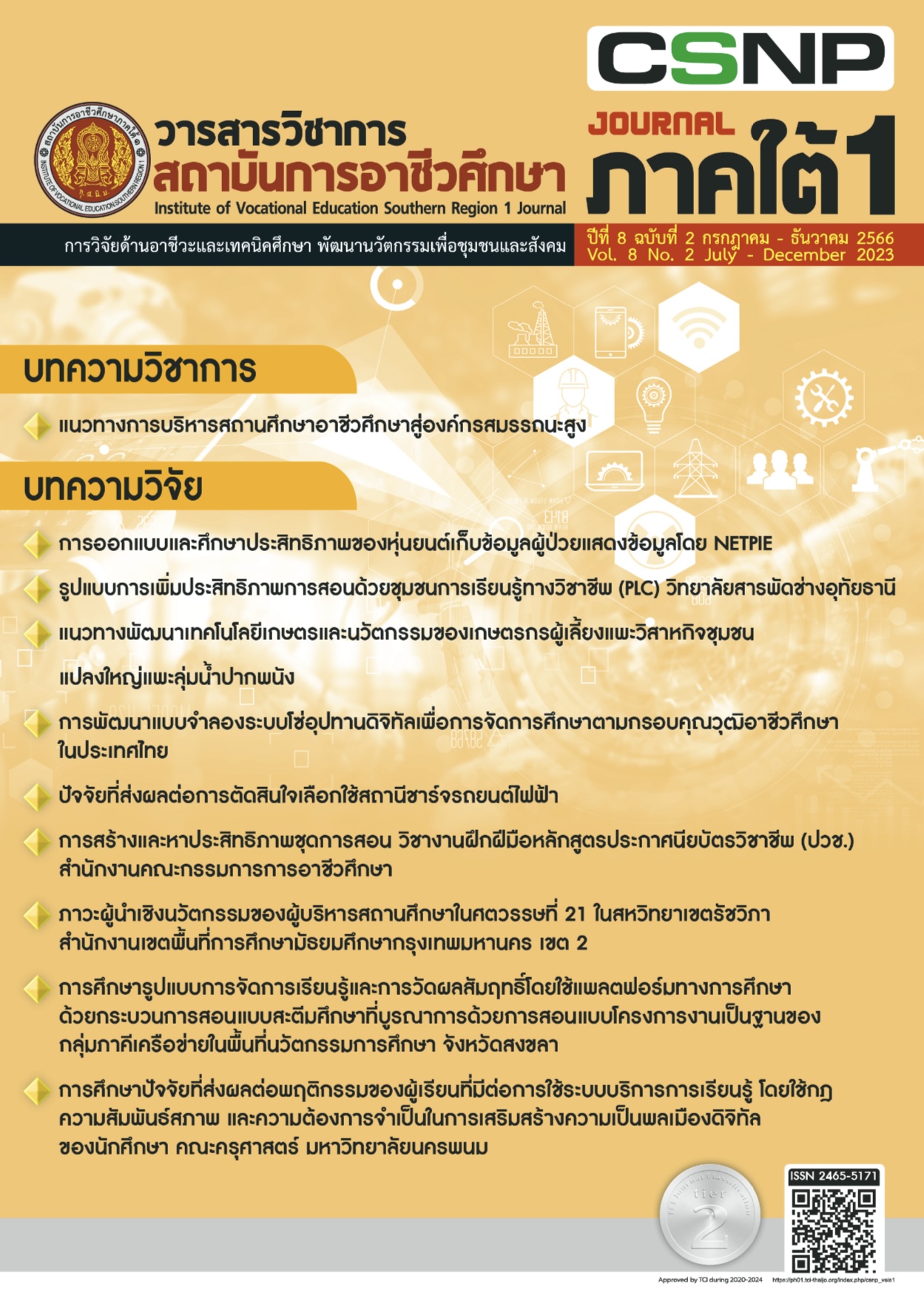การศึกษารูปแบบการจัดการเรียนรู้และการวัดผลสัมฤทธิ์โดยใช้แพลตฟอร์มทางการศึกษา ด้วยกระบวนการสอนแบบสะตีมศึกษาที่บูรณาการด้วยการสอนแบบโครงการงานเป็นฐานของกลุ่มภาคีเครือข่ายในพื้นที่นวัตกรรมการศึกษา จังหวัดสงขลา
คำสำคัญ:
สะตีมศึกษา, การสอนแบบโครงงานเป็นฐาน, การจัดการเรียนรู้, แพลตฟอร์มทางการศึกษาบทคัดย่อ
การวิจัยนี้มีวัตถุประสงค์เพื่อ 1) ออกแบบการจัดการเรียนรู้ด้วยกระบวนการสอนแบบสะตีมศึกษาที่บูรณาการด้วยการสอนแบบโครงการงานเป็นฐาน 2) พัฒนาเครื่องมือวัดผลและประเมินผลโดยใช้แพลตฟอร์มทางการศึกษา 3) ประเมินความพึงพอใจต่อการจัดการเรียนรู้และการวัดผลสัมฤทธิ์โดยใช้แพลตฟอร์มทางการศึกษาด้วยกระบวนการสอนแบบสะตีมศึกษาที่บูรณาการด้วยการสอนแบบโครงการงานเป็นฐาน ประชากรที่ใช้ในการวิจัยคือครูผู้สอน/บุคลากรทางการศึกษา กลุ่มภาคีเครือข่ายในพื้นที่นวัตกรรมการศึกษา จังหวัดสงขลาพื้นที่ภาคใต้ จำนวน 50 คน ได้มาโดยวิธีเลือกแบบเฉพาะเจาะจง เครื่องมือที่ใช้ในการวิจัยประกอบด้วย แบบประเมินความเหมาะสมและความสอดคล้อง แบบประเมินความพึงพอใจ สถิติที่ใช้ ได้แก่ การหาค่าเฉลี่ย (Mean) ส่วนเบี่ยงเบนมาตรฐาน (S.D.) และแปลผลโดยนำค่าเฉลี่ยมาเทียบกับเกณฑ์
ผลการวิจัยพบว่า 1) การจัดการเรียนรู้ด้วยกระบวนการสอนแบบสะตีมศึกษาที่บูรณาการด้วยการสอนแบบโครงการงานเป็นฐาน ประกอบด้วย 5 ขั้นตอนคือ การระบุปัญหา (Define) รวบรวมข้อมูล (Discover) การออกแบบ วางแผน พัฒนา (Design Plan and Develop) การทดสอบและประเมินผล (Test and Evaluation) และการนำเสนอผลลัพธ์ (Present the Creation) 2) ผลการพัฒนาเครื่องมือวัดผลและประเมินผลโดยใช้แพลตฟอร์มทางการศึกษา โดยภาพรวมเครื่องมือมีคุณภาพอยู่ในระดับมากที่สุด และ 3) ผลการประเมินความพึงพอใจของผู้สอนและผู้เรียนที่มีต่อแพลตฟอร์มทางการวัดและประเมินผล เฉลี่ยโดยรวมอยู่ในระดับมากที่สุด
เอกสารอ้างอิง
สำนักงานศึกษาธิการจังหวัดสงขลา. (2562). แผนพัฒนาการศึกษา (พ.ศ.2563 - 2565) จังหวัดสงขลา. สงขลา: สำนักงาน.
สมศักดิ์ ดลประสิทธิ์. (2564). แนวทางการจัดการศึกษาเพื่อการพัฒนากำลังคนในศตวรรษที่ 21. คุรุสภาวิทยาจารย์, 2(1), 1-16.
วิลาวัลย์ โพธิ์ทอง. (2561). เทคโนโลยีกับการเรียนรู้ตลอดชีวิตของครู. วารสารการวิจัยเพื่อพัฒนาชุมชน มหาวิทยาลัยนเรศวร, 11(2), 18-26.
พระราชบัญญัติข้าราชการครูและบุคลากรทางการศึกษา (ฉบับที่ 3) พ.ศ. 2553. (2553, 22 กรกฎาคม). ราชกิจจานุเบกษา. เล่ม 127 ตอนที่ 45 ก. 7-11.
ประวีนา เอี่ยมยี่สุ่น. (2560). การพัฒนาหลักสูตรฝึกอบรม เรื่อง การวัดและประเมินผลการเรียนรู้ สำหรับนักศึกษาฝึกประสบการณ์วิชาชีพครู คณะศิลปศึกษา สถาบันบัณฑิตพัฒนศิลป์. วารสารวิชาการ มหาวิทยาลัยราชภัฏพระนคร, 8(1), 210-219.
สุวัทนา สงวนรัตน์ และชวน ภารังกูล. (2564). หลักสูตรและการเรียนการสอนฐานสมรรถนะในสถานศึกษา. วารสารสิรินธรปริทรรศน์, 22(2), 351-364.
มณีญา สุราช. (2560). การวัดและประเมินผลการศึกษา. อุดรธานี: คณะครุศาสตร์ มหาวิทยาลัยราชภัฏอุดรธานี.
ธานินทร์ อินทรวิเศษ และคณะ. (2562). เทคโนโลยีและนวัตกรรมกับการจัดการเรียนการสอนในยุคดิจิทัล. วารสาร Veridian E Journal ฯ สาขามนุษยศาสตร์ สังคมศาสตร์ และศิลปะ, 12(6), 478-494.
ปรัชญา ซื่อสัตย์ และวิสูตร โพธิ์เงิน. (2564). การพัฒนาชุดกิจกรรมพัฒนาผู้เรียนโดยใช้การจัดการเรียนรู้ตามแนวคิด STEAM ร่วมกับโครงงานเป็นฐาน เพื่อส่งเสริมความเป็นนวัตกรและผลงานสร้างสรรค์หุ่นกระบอก สำหรับนักเรียนชั้นมัธยมศึกษาตอนต้น. วิทยานิพนธ์ศึกษาศาสตรมหาบัณฑิต สาขาวิชาหลักสูตรและการสอน ภาควิชาหลักสูตรและวิธีสอน บัณฑิตวิทยาลัย มหาวิทยาลัยศิลปากร, กรุงเทพมหานคร.
เจนจิรา สันติไพบูลย์ และวิสูตร โพธิ์เงิน. (2561). การจัดกิจกรรมพัฒนาผู้เรียนตามแนวคิด STEAM ร่วมกับการสอนเชิงผลิตภาพเพื่อส่งเสริมทักษะกระบวนการ และความสามารถในการสร้างสรรค์ผลงาน ของนักเรียนชั้นประถมศึกษาปีที่ 3. วารสารครุศาสตร์ จุฬาลงกรณ์มหาวิทยาลัย, 46(3), 69-85.
ดาวน์โหลด
เผยแพร่แล้ว
ฉบับ
ประเภทบทความ
สัญญาอนุญาต
ลิขสิทธิ์ (c) 2023 วารสารวิชาการสถาบันการอาชีวศึกษาภาคใต้ 1

อนุญาตภายใต้เงื่อนไข Creative Commons Attribution-NonCommercial-NoDerivatives 4.0 International License.



